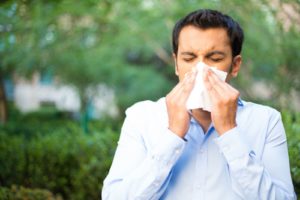Seasonal Allergies. By Our Student Pharmacist, Cambree Fillis.
According to the Centers for Disease Control and Prevention (CDC), over 50,000,000 Americans suffer from allergies each year, especially as seasons start to change and warm weather emerges.
Allergies are a result of the immune system attempting to get rid of a substance that it does not recognize. Seasonal allergies are usually due to pollen from trees and grass, as well as different molds that grow in warm, humid weather.
Nevertheless, whether it is something consumed, inhaled, injected, or touched, your body can mount an immune response. This response can present as a cough, sneeze, itchy or watery eyes, scratchy throat, runny nose, rash, difficulty breathing, asthma exacerbation, and possibly even death if anaphylaxis results and is not treated promptly. Anaphylaxis is usually a reaction to food, latex, insect bites, and medications- not pollen. Therefore, seasonal allergies are not usually life-threatening, but can result is much discomfort. Fortunately, the symptoms of seasonal allergies can be managed.
Seasonal allergy treatments include prevention or treatment with over-the-counter and/or prescription medications, as well as immunotherapy.
To prevent allergies, avoiding whatever it is that you are allergic to sometimes works best. For instance, if you are allergic to pollen, limiting your time outdoors or keeping your air conditioner on as to avoid opening windows will limit your exposure. If you cannot avoid the allergen, be sure to bathe daily. This will remove allergens from your skin. Washing bedding every week also limits allergen build up.
If allergies cannot be prevented with non-pharmacological interventions such as avoidance and staying clean, ask your pharmacist about over-the-counter and prescription medications that can be used instead. In many cases more than one treatment may be used to alleviate symptoms. Your pharmacist can tell you which ones! Use the following information to get the conversation started.
- Nasal Rinses: A Neti-Pot can be used to rinse the nasal cavity and get rid of pollen in the nose. It is important to use distilled water whenever using a Neti-Pot.
- Nasal Sprays: Nasal sprays work in various ways to alleviate allergy symptoms. There are saline nasal sprays, steroid nasal sprays, antihistamine nasal sprays, and decongestant nasal sprays, all of which can be found over-the-counter. Steroid nasal sprays take several days to start working, but once they do they help with congestion and post-nasal drip by reducing inflammation in the nose. Antihistamine nasal sprays relieve the itchy, runny nose, and decongestant nasal sprays, such as Afrin, help with stuffiness. Afrin, however, should not be used for more than 3 days in a row, as it can cause rebound congestion.
- Eye Drops: Ketotifen (Zaditor) is an over-the-counter option for itchy, watery eyes; Olopatadine (Pazeo) will also relieve allergy-related symptoms affecting the eyes but is prescription only. No matter which eye drop you use, always be sure to wash your hands before administering them!
- Antihistamines: Antihistamines help with itching, sneezing, and runny noses. Examples include, diphenhydramine (Benadryl) and chlorpheniramine, which can both cause drowsiness. Less sedating antihistamine options that you can find over-the-counter include loratadine (Claratin), fexofenadine (Allegra), and cetirizine (Zyrtec).
- Decongestants: Decongestants reduce nasal stuffiness. They can come in various forms including a nasal spray, such as Afrin mentioned previously, or in a tablet or liquid form, such as pseudoephedrine (Sudafed). Some forms can increase blood pressure; therefore it is important to always ask your doctor or pharmacist which decongestant is best for you.
- Creams/ointments: corticosteroid creams and ointments relieve itchiness from a rash caused by an allergen. Steroid topical products should not be used for more than 14 days, especially if applying to the face.
When allergies cannot be prevented or treated with over-the-counter or prescription medications, immunotherapy can be used. Immunotherapy includes allergy shots and sublingual tablets that dissolve under the tongue.
Allergy shots have been used for decades and work by exposing patients to the substance that they are allergic to in increasing amounts. This gradual exposure is thought to create immunity and lessen allergic reactions.
Immunotherapy in a newer sublingual treatment can be used as an alternative to the shots.
Resources
1. Asthma and Allergy Foundation of America. Allergy Treatment. Updated March 2018. Accessed April 2019. https://www.aafa.org/allergy-treatments/.
2. Centers for Disease Control (CDC). Allergies. Updated September 2017. Accessed April 2019. www.cdc.gov/healthcommunication/ToolsTemplates/EntertainmentEd/Tips/Allergies.html.
3. Hennessy M. Helping Patients Breathe Easier. Published March 2019. Accessed April 2019. https://www.pharmacytimes.com/publications/health-system-edition/2019/march2019/helping-patients-breathe-easier.
4. Tl;dr Pharmacy. Preparing for Spring: Allergic Rhinitis. Updated February 2019. Accessed April 2019. https://www.tldrpharmacy.com/content/preparing-for-spring-allergic-rhinitis.
5. Patient education: Seasonal allergies in adults. UpToDate. Updated April 2019. Accessed April 2019.




